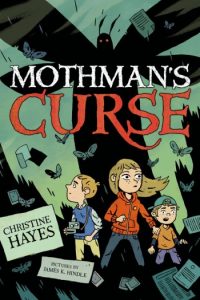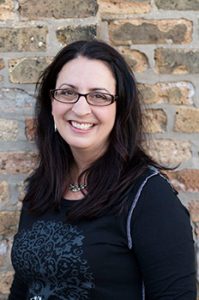 We continue our series of interviews with recent AML Award winners, with Rebecca J. Carlson’s interview of Christine Hayes, who won the 2015 AML Middle Grade Novel Award, for her debut novel, Mothman’s Curse. Hayes was also a finalist for the Whitney Middle Grade and Best Novel by a New Artist awards, and won the Friends of American Writers Young People’s Literary Award. Rebecca J. Carlson is an instructor at BYU-Hawaii.
We continue our series of interviews with recent AML Award winners, with Rebecca J. Carlson’s interview of Christine Hayes, who won the 2015 AML Middle Grade Novel Award, for her debut novel, Mothman’s Curse. Hayes was also a finalist for the Whitney Middle Grade and Best Novel by a New Artist awards, and won the Friends of American Writers Young People’s Literary Award. Rebecca J. Carlson is an instructor at BYU-Hawaii.
On your blog you mention several of your favorite middle grade authors, like Cleary and Blume, and on the fantasy side Lloyd Alexander and C. S. Lewis. When I read Mothman’s Curse I thought it had a great classic children’s lit feel to it. Was that by design, or do you think you wrote it that way because that’s what you love to read?
Maybe a little of both! I was obsessed with reading as a child, but after taking a children’s literature course in college I was introduced to all kinds of authors I had somehow missed growing up—Lloyd Alexander, Susan Cooper, Zilpha Keatley Snyder, John Bellairs, and so many more. That class definitely influenced my taste in books, so it makes sense that it also heavily influenced my preferred style of writing.
I loved the relationship between Josie and her brothers and the way that the little tensions between them and also their teamwork and loyalty to each other drive a lot of the story. Did you draw on life experience to create the sibling dynamic for the book?
Thank you! I’ve always loved reading and writing about siblings because alongside the inevitable conflicts, there are these gratifying moments of solidarity as they face adversity together. I’m the youngest of four kids. My brothers were quite a bit older, so I was closer with my sister growing up. Although our personalities are very different, we played together often and had some fun little inside jokes. But I think an even stronger influence was the dynamic between my own children. They know how to push each other’s buttons, but they can also be surprisingly generous and loyal.
 When I was in fourth grade, I couldn’t get enough ghost stories, even though they made it hard for me to get to sleep at night. I’m not alone, as evidenced by the fact that the Goosebumps series was the all time top seller in children’s books until Harry Potter came along. Why, do you think, are kids so fascinated with spooky stories?
When I was in fourth grade, I couldn’t get enough ghost stories, even though they made it hard for me to get to sleep at night. I’m not alone, as evidenced by the fact that the Goosebumps series was the all time top seller in children’s books until Harry Potter came along. Why, do you think, are kids so fascinated with spooky stories?
Great question! Kids have plenty of scary things to deal with in their lives: navigating the sometimes cruel social order at school, developing their own identities apart from their parents and siblings, feeling greater pressure to do well on homework and tests, and facing the looming specter of middle school/junior high. And that’s if they have a relatively stable, healthy family situation. Many deal with much more serious and painful problems. A scary book can serve not only as a thrilling escape, but also as a way to test their courage as they vicariously face monsters, ghosts, and other ruthless adversaries. It’s a way of putting a toe into the wider, more dangerous world, while knowing that they will still emerge safe and whole when they turn that final page.
I was surprised to learn that Mothman is not a spook you made up, but a part of American folklore. When did you first hear about Mothman? When did you decide to write about him?
I find Mothman particularly fascinating because he’s so unusual and still relatively obscure. I remember when the 2002 movie with Richard Gere came out—that’s probably the first time Mothman entered my consciousness. I didn’t actually see the movie until it was on TV many years later, but I remember a surge of interest just at the title alone (and likely filed it away for future use). MOTHMAN’S CURSE started out as a simple ghost story, but I soon discovered it needed another major element to shape the plot. During a research trip to the library, I found the book THE MOTHMAN PROPHECIES on a table right beside the checkout counter. I knew as soon as I started reading that Mothman was the missing piece I’d been searching for.
What other elements of actual folklore did you incorporate in the book? What parts did you make up on your own?
I borrowed the idea that Mothman is a harbinger of disaster, along with his basic physical description. From there I had a lot of fun dreaming up a backstory for him. Where did this creature come from, and why is he the way that he is? A half man, half moth with burning red eyes? That’s gold right there!
I thought it was really fun to read a ghost story written by an LDS author because, well, Mormons believe in ghosts. It’s part of our doctrine that the spirits of the dead are around us, aware of us, and under certain circumstances can interact with those of us who are still alive. Do you think you drew on any aspects of Mormon thought or Mormon folklore about ghosts for Mothman’s Curse?
When I think of spirits in relation to my religious beliefs, I think of them as benevolent beings, perhaps allowed to return in order to comfort a loved one or prompt them into making some sort of change in their lives. I do like the idea that a spirit can linger because of a desire to resolve unfinished business.
I’m also fascinated by the concept of angry spirits. Right now I’m reading the LOCKWOOD & CO. books by Jonathan Stroud, and he does an incredible job of building a believable reality around “The Problem”—the fact that ghosts are a real and threatening presence in the modern world, and kids with psychic talents are the only ones who can fight them. This doesn’t really gel with my actual beliefs, but it’s still by far my favorite kind of book. While I do believe in darker forces that are actively working against the better nature of humanity, I don’t think of them as spirits that were once living, breathing humans. Hmmm. Now you’ve really got me thinking!
How long have you known you wanted to write books?
Since third or fourth grade, when I participated in a young author’s program. We got to turn our stories into hand-bound books and attend a conference with a real children’s author. I decided it would be the coolest job in the world.
What other things have you written?
I’ve written articles for a small-town newspaper and marketing materials for a health food company and a scrapbooking company. Those were my paying jobs. I wrote middle grade novels on the side—slowly, painfully, and with a huge learning curve. My third completed middle grade novel was the one that helped me find my agent, though that book never did sell. MOTHMAN’S CURSE was book #4. I’ve also written a few picture book manuscripts, which I’m still tweaking to get them just right. The picture book authors I’ve met are extremely talented; it really is a difficult format to perfect!
What are you working on or planning to write next?
I’ve recently finished another standalone middle grade humor/adventure story, which we’re getting ready to submit to several editors. It’s a long process, but well worth it!
Anything else you’d like to share with the AML blog audience?
I believe that both kids and adults should read what they love, with no shame or stigma attached. I’m bothered by the notion that only certain genres are considered “respectable.” The point of reading is not to impress others with our literary prowess. Books entertain AND educate. They provide comfort and teach compassion. And they open our eyes to a larger world. I don’t mean to say that we should never stretch ourselves or read anything outside our comfort zone. On the contrary, I think reading widely is an essential part of the search for knowledge and truth. But we shouldn’t let our choices be dictated by fear of judgment.

I agree about not reading to impress others. I tried reading an entire list of classics for a while, at the exclusion of my usual reading for entertainment, and almost ruined reading for myself. Samuel Beckett nearly took me out.
…..I love to read and write multiple genres, from the very literary to the incredibly fluffy. Your book sounds like a lot of fun.